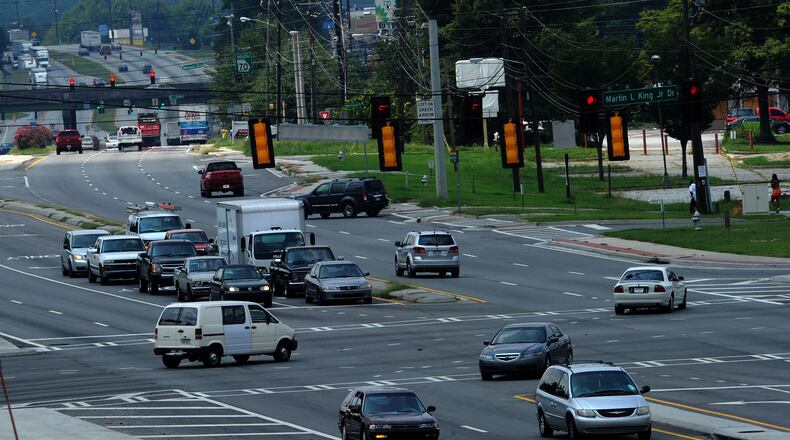Fulton County voters will go to the polls Nov. 6 to decide whether to undo a state constitutional amendment that kept the Fulton Industrial area from being annexed into a city. But if they choose to lift it, it will accelerate the fight over who gets the last unincorporated part of the county.
Atlanta has long had its eye on the area, and has twice gone to the state supreme court — most recently, this week — to try to get the 1979 amendment lifted. South Fulton, which has been a city for a year and a half, also wants to annex the area.
For both cities, it's a matter of money. Fulton Industrial district is about 7.5 square miles of mostly industrial space that brings an estimated $6.5 million in tax revenue to the county each year. It runs along Fulton Industrial Boulevard, south of Six Flags on the Fulton side of the Chattahoochee River. The district has a workforce of more than 20,000 people and about 46 million square feet of industrial space, according to Rep. Roger Bruce, D-South Fulton.
Residents across the county will vote on the measure. Meanwhile, the state supreme court is considering whether the constitutional amendment is valid at all. The court heard arguments from Atlanta and Fulton County on Wednesday, but typically takes several months to rule. It is likely that the vote will be held before a decision is made by the court.
Bruce originally wrote legislation that would allow South Fulton to annex the district if voters repealed the amendment, but Gov. Nathan Deal vetoed that portion of the legislation. Instead, the only question before voters is whether anyone should have the opportunity to annex the land into their city. The district is the only area where Fulton County still provides municipal services, such as police and road maintenance.
County commissioners have not taken a position on the ballot question, said Jessica Corbitt, a spokesperson for the county. But earlier this year, Fulton County Commission Chairman Robb Pitts sent Deal a letter, urging him to sign the legislation that the governor vetoed. In it, Pitts said he believed putting Fulton Industrial into the new city “would strengthen” South Fulton and was in the best interest of the county.
A spokesperson for Atlanta did not respond to a request for comment about the district, but Melissa Mullinax, then a senior advisor to Mayor Keisha Lance Bottoms, said in March that the city’s preference is that the southern portion of the district go to South Fulton, while the northern portion go to Atlanta.
“The interests of the entire community would be better served by collaborative discussion between the City of Atlanta, the City of South Fulton and the Fulton Industrial District stakeholders as to how municipal services could best be provided in that area,” she said in a statement.
South Fulton Mayor Bill Edwards said he favors the restriction on annexation being lifted — but only if voters agreed.
“That’s where it should be, it should be at the ballot box,” he said. “I want it lifted, that’s my goal. But let’s not play politics.”
Edwards accused Atlanta of being “greedy” in trying to annex the district, when it has projects like the Gulch that could bring in additional tax revenue. He added that if Atlanta is successful in annexing the area, the county school system would suffer because of lost tax revenue.
It’s unclear if that would happen. The constitutional amendment also prohibits Fulton County from levying school taxes within the boundaries of Atlanta Public Schools, but that provision would also be repealed if the vote passes. The issue over school tax levies in the district would likely have to be settled by the courts.
Kaye Burwell, who argued on behalf of Fulton County, said county residents, not Atlanta’s mayor, should decide the area’s future.
“From the city’s point of view, I think it makes sense to lift the cap and allow Fulton Industrial to be included in the city limits,” said Odie Donald, the South Fulton city manager. “It’s a no-brainer for Fulton Industrial to come into the city.”
The ballot question:
Shall the Act be approved which repeals the amendment to the Constitution of Georgia creating within Fulton County the Fulton County Industrial District and prohibiting the governing authority of Fulton County from levying any tax for educational purposes within the boundaries of an independent school system?
RELATED
About the Author
Keep Reading
The Latest
Featured


